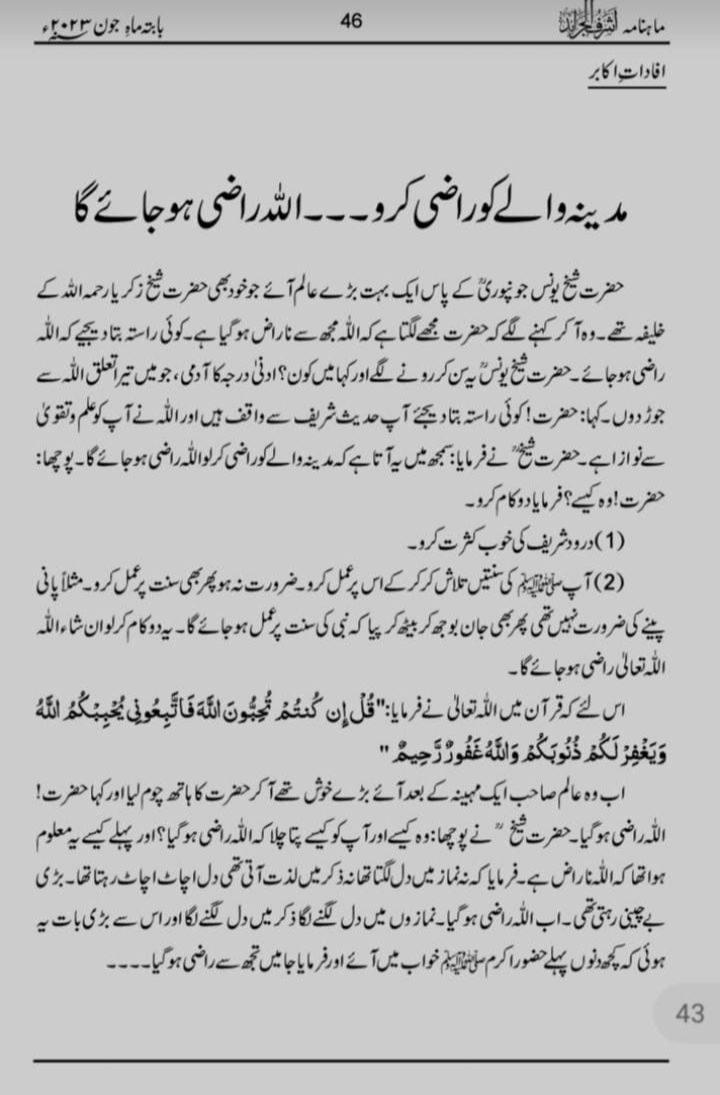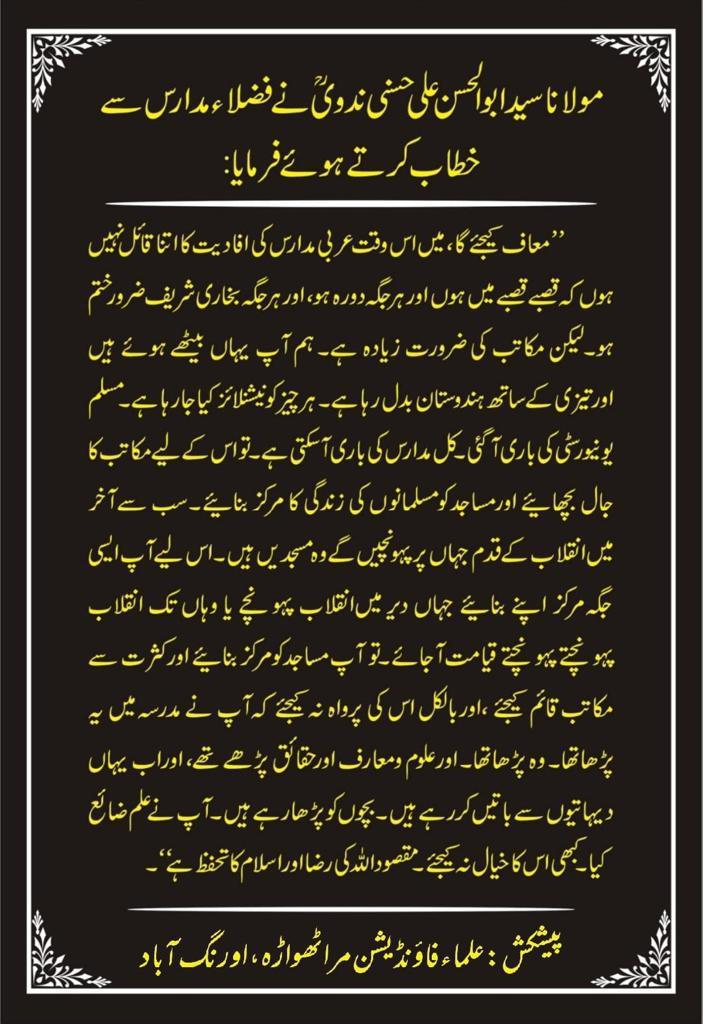Aamaal-e-Saalihah (Good Deeds) most beloved to Allah
عَنِ ابْنِ عَبَّاسٍ رَضِيَ اللّٰهُ عَنْهُمَا قَالَ: قَالَ رَسُوْلُ اللّٰهِ صَلَّى اللّٰهُ عَلَيْهِ وَسَلَّمَ: مَا مِنْ أَيَّامٍ الْعَمَلُ الصَّالِحُ فِيْهِنَّ أَحَبُّ إِلَى اللّٰهِ مِنْ هَذِهِ الْأَيَّامِ الْعَشَرَةِ قَالُوْا يَا رَسُوْلَ اللّٰهِ وَلَا الْجِهَادُ فِيْ سَبِيْلِ اللّٰهِ؟ قَالَ وَلَا الْجِهَادُ فِيْ سَبِيْلِ اللّٰهِ إِلَّا رَجُلٌ خَرَجَ بِنَفْسِهِ وَمَالِهِ فَلَمْ يَرْجِعْ مِنْ ذَلِكَ بِشَيْءٍ . رَوَاهُ التِّرْمِذِىُّ
Hadhrat Ibn Abbaas radiyallahu anhu narrates that Rasulullah sallallahu alayhi wasallam said; “There are no days wherein good deeds are more beloved to Allah Ta’ala than on these ten days [of Zul Hijjah]. [The Sahaabah M] enquired, ‘O Rasulullah, not even Jihaad in the path of Allah.’ He H replied, ‘Not even Jihaad in the path of Allah except for that person who went out with his life and his wealth and did not return.’” [Tirmizi #757]
Fasting and staying awake at night in Ibaadah
عَنْ أَبِيْ هُرَيْرَةَ رَضِيَ اللّٰهُ عَنْهُ قَالَ قَالَ رَسُوْلُ اللّٰهِ صَلَّى اللّٰهُ عَلَيْهِ وَسَلَّمَ: مَا مِنْ أَيَّامٍ أَحَبُّ إِلَى اللّٰهِ أَنْ يُتَعَبَّدَ لَهُ فِيْهَا مِنْ عَشْرِ ذِي الْحِجَّةِ يَعْدِلُ صِيَامُ كُلِّ يَوْمٍ مِنْهَا بِصِيَامِ سَنَةٍ وَقِيَامُ كُلِّ لَيْلَةٍ مِنْهَا بِقِيَامِ لَيْلَةِ الْقَدْرِ . رَوَاهُ التِّرْمِذِيُّ
Hadhrat Abu Hurayrah radiyallahu anhu narrates that Rasulullah sallallahu alayhi wasallam said; “There are no days wherein Allah Ta’ala loves that He be worshipped, more than the first ten days of Zul Hijjah. Fasting on one day (in these ten days) equals to the fasting of one year and staying awake at night [in ibaadah] equals to staying awake in Ibaadah on the night of Qadar.” [Tirmizi # 758]
From this Hadith we understand the importance of dedicating our time and effort during these days in the ibaadah (worship) of Allah Ta’ala. Who has the ability of fasting for so many years? If a Muslim makes an effort to fast on these mubaarak (blessed) days, he will receive the reward of fasting for so many years.
We try our best to find Laylatul Qadar in the last ten days of the mubaarak month of Ramadhaan. People all over the world sit in I’tikaaf with the hope of finding this Mubaarak night. At the end of Ramadhaan discussions ensue as to which night of Ramadhaan they felt was Laylatul Qadar. However, the exact night of Laylatul Qadar is known only to Allah Ta’ala. In the above mentioned Hadith, Rasulullah sallallahu alayhi wasallam is clearly telling us that Ibaadah done on these ten nights equals to the Ibaadah performed on Laylatul Qadar. How unfortunate will we be if we do not take advantage of this golden opportunity and gain great sawaab. May Allah Ta’ala bless us with the Taufeeq (ability) of spending our time profitably in these ten days. Aameen.
Zikr of Tasbeeh, Tahmeed, Takbeer and Tahleel
Rasulullah sallallahu alayhi wasallam has encouraged us in these days to recite Tasbeeh (Subhanallah), Tahmeed (Alhamdulillah), Tahleel (Laa-ilaha illallah) and Takbeer (Allahu Akbar) in abundance.[1]
In these ten days one should, as far as possible, keep the zikr of the third kalimah on his tongue. Recite this zikr as much as possible. Whilst walking, working, driving, lying down, etc. keep on reciting this kalimah. You will be rewarded immensely for this.
Clipping of nails and trimming of hair
عَنْ أُمِّ سَلَمَةَ رَضِيَ اللّٰهُ عَنْهَا قَالَتْ: قَالَ رَسُوْلُ اللّٰهِ صَلَّى اللّٰهُ عَلَيْهِ وَسَلَّمَ: إِذَا دَخَلَتِ الْعَشْرُ وَأَرَادَ أَحَدُكُمْ أَنْ يُضَحِّيَ فَلَا يَمَسَّ مِنْ شَعْرِهِ وَبَشَرِهِ شَيْئًا . رَوَاهُ مُسلم
Hadhrat Umm-e-Salamah radiyallahu anha reports that Rasulullah sallallahu alayhi wasallam said: “When the ten days [of Zul Hijjah] commence and any of you intend to make Qurbaani, then he should not remove his hair or trim his nails.” [Muslim: # 1977]
To practice on this Hadith, one should clip his nails and remove his hair before the crescent of Zul Hijjah is sighted. Thereafter, for the ten days of Zul Hijjah, he should neither trim his hair nor clip his nails until he has completed performing his Qurbaani. This act according to the Fuqahaa has been declared as Mustahab.
Fasting on the 9th (Day of Arafah)
عَنْ أَبِيْ قَتَادَةَ رَضِيَ اللّٰه عَنْهُ قَالَ: قَالَ رَسُوْلُ اللهِ صَلَّى اللهُ عَلَيْهِ وَ سَلَّمَ صِيَامُ يَوْمِ عَرَفَةَ إِنِّيْ أَحْتَسِبُ عَلَى اللهِ أَنْ يُّكَفِّرَ السَّنَةَ الَّتِيْ قَبْلَهُ وَالَّتِيْ بَعْدَهُ وَ فِيْ رِوَايَةٍ اَنَّ رَسُوْلَ اللهِ صَلَّى اللهُ عَلَيْهِ وَ سَلَّمَ قَالَ مَنْ صَامَ يَوْمَ عَرَفَةَ غُفِرَ لَهُ سَنَةٌ أَمَامَهُ وَسَنَةٌ بَعْدَهُ
Hadhrat Abu Qatadah radiyallahu anhu narrates that Rasulullah sallallahu alayhi wasallam said, “One who fasts on the day of Arafah, I have hope in Allah Ta’ala that He will forgive his sins of the previous year as well as his sins of the next year.” [Tirmizi # 749]
In this Hadith Rasulullah sallallahu alayhi wasallam mentions the virtue of fasting on the 9th of Zul Hijjah. If anyone is unable to fast on the first 8 days of Zul Hijjah, he should at least try to fast on the 9th of Zul Hijjah and have all his sins forgiven. How merciful is Allah Ta’ala! A person fasts for one day and Allah Ta’ala, The Most Kind, The Most Merciful, forgives all his sins for the past year as well as the coming year.
One Day Equals to a 1000 Days
Hadhrat Anas radiyallahu anhu has mentioned that the Sahaabah radiyallahu anhum would say that each of the first ten days of Zul Hijjah is equal to one thousand days in virtue, while the 9th (day of Arafah) is equal to ten thousand days in virtue.
Staying awake on the night of Eid
Hadhrat Shaikhul Hadeeth, Moulana Muhammad Zakariyyah (rahmatullahi alayh) has mentioned the following Hadith in his famous book Fazaail-e-Ramadhaan,
عَنْ عُبَادَةَ بْنِ الصَّامِتِ رَضِيَ اللّٰهُ عَنْهُ أَنَّ رَسُوْلَ اللهِ صَلَّى اللهُ عَلَيْهِ وَسَلَّمَ قَالَ: مَنْ أَحْيَا لَيْلَةَ الْفِطْرِ وَالْاَضْحَى، لَمْ يَمُتْ قَلْبُهُ يَوْمَ تَمُوْتُ الْقُلُوْبُ
Rasulullah sallallahu alayhi wasallam said, “Whoever remains awake for Ibaadah on the nights before both the Eids, his heart shall not die on that day when hearts shall die.” [At Targheeb wat Tarheeb # 1655 & 1657]
This night too should be appreciated. Most of us enjoy our sleep on this night, whereas this night too is a night that should be spent in Ibaadah. “His heart shall not die” means that at the time when evil will overpower all, his heart shall stay alive (guarded against evil). It may also refer to the time when the Soor (trumpet) shall be blown to announce the day of Qiyaamah on that day he will not become unconscious.
[1] At Targheeb wat Tarheeb # 1782




